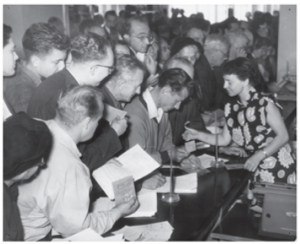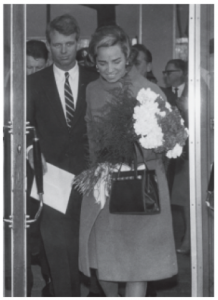“Today we are laying the cornerstone of the American Memorial Library. It is to be open to all who desire to enter and learn what men of all nations and all beliefs have thought and written. It is the freedom to learn, to study, to seek the truth. This is the essence of a free society. This is the source of our greatest strength.”
It’s the year 1952 – a hot June day in West Berlin. The city’s mayor, Ernst Reuter; U.S. High Commissioner for Germany, John McCloy; and American Secretary of State, Dean Acheson, are laying the cornerstone for the first American public library in Germany, the Amerika Gedenkbibliothek (American Memorial Library). In his speech, Acheson not only gives hope to the people of Berlin – who live in a divided city after a horrendous war – he also delivers a message that is perhaps more topical than ever.
Shortly after McCloy’s and Acheson’s visit to West Berlin, the construction for the American Memorial Library – based on designs by the German American architects Fritz Bornemann and Willy Kreuer – begins on Blücherplatz in Kreuzberg. In recognition of the citizens’ courage and resilience during the Berlin Blockade, the library was financed through a donation by the American people and partially supported by the Marshall Fund. As a symbol of educational freedom and freedom of speech, the American Memorial Library was officially inaugurated in 1954.

The attractiveness of the American Public Library was the service-oriented help offered and the research system which allowed visitors to search within a thematic field. The library was open to all, no matter what social or educational background, and its goal was to make knowledge accessible to everyone.
Besides books from the humanities and social sciences, pop culture also found its place: Right from the start, the library had a phonetic department with more than 1,000 records which made it very popular with young users. The first registered user with card number 00001, Herr Lohmann, explained that he was so curious and excited that he pretended to have a toothache so he could leave work and participate in the opening ceremony.
With the construction of the Berlin Wall and the physical separation of the city in 1961, the concept of an accessible library became a privilege for the citizens of West Berlin only. The library’s director, Dr. Fritz Moser, remembered some emotional stories: A father who apologized for his son’s late book return because the son was arrested at a train station in East Berlin. Another user said he was sorry that he couldn’t return his books because he escaped the East and had to swim through the Teltow canal.
Eventually, however, both the political atmosphere during the Cold War and the involvement of the United States in Vietnam led to an increasingly hostile stance towards the United States. Even the visit of the Minister of Justice, Robert Kennedy, and his wife in February 1962 did not decrease tensions in the upcoming years. Instead, an arson attack in 1969 as well as several bomb scares were daily occurrences.

Only Germany’s reunification in 1990 changed the library’s downward spiral. Due to an increased demand, the American Memorial Library (in former West Berlin) and the Berlin City Library (in former East Berlin) became one. The Berlin Central and Regional Library (Zentral- und Landesbibliothek Berlin) now has more than 3.4 million media material.
Today, 65+ years after the opening of the American Memorial Library, the political climate across the Atlantic is once again challenging. This encourages us to remember the essential idea of this library in a once divided city: Openness, tolerance, and diversity – values that can tear down imagined walls until today.
21,238 Total Views, 6 Views Today






